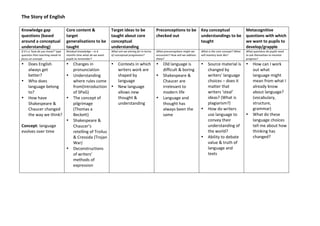Melden
Teilen
Downloaden Sie, um offline zu lesen

Empfohlen
Empfohlen
Weitere ähnliche Inhalte
Was ist angesagt?
Was ist angesagt? (20)
If Rosa Parks Could Text: Content Area Writing in the Literacy Block

If Rosa Parks Could Text: Content Area Writing in the Literacy Block
Andere mochten auch
Andere mochten auch (20)
Developing the beautiful struggle. Progress and Assessment in Education #TLT1...

Developing the beautiful struggle. Progress and Assessment in Education #TLT1...
Ähnlich wie Year 7 story of english
Ähnlich wie Year 7 story of english (20)
MANAGEMENT OF CULTURAL ENTITIES IN SPOKEN ENGLISH: A Discourse Analysis

MANAGEMENT OF CULTURAL ENTITIES IN SPOKEN ENGLISH: A Discourse Analysis
Seeing and Reading the City (Charitos & Welsh, GLoCALL 2015)

Seeing and Reading the City (Charitos & Welsh, GLoCALL 2015)
Session 3 emergent readers concept of print 2014 Sample

Session 3 emergent readers concept of print 2014 Sample
Mehr von David Didau
Mehr von David Didau (20)
What if everything you know about mindsets and resilience is wrong?

What if everything you know about mindsets and resilience is wrong?
What if everything you knew about curriculum design was wrong?

What if everything you knew about curriculum design was wrong?
The Secret of Literacy: an idiot sheet created by @GnuBee

The Secret of Literacy: an idiot sheet created by @GnuBee
Year 7 story of english
- 1. The Story of English Knowledge gap questions (based around a conceptual understanding) Core content & target generalisations to be taught Target ideas to be taught about core conceptual understanding Preconceptions to be checked out Key conceptual understandings to be taught Metacognitive questions with which we want to pupils to develop/grapple If it’s a ‘how do you know?’ type question then teaching needs to focus on concept Residual knowledge – in 6 months time what do we want pupils to remember? What are we aiming for in terms of conceptual progression? What preconceptions might we encounter? How will we address these? What is the core concept? What will mastery look like? What questions do pupils need to ask themselves to monitor progress? • Does English always get better? • Who does language belong to? • How have Shakespeare & Chaucer changed the way we think? Concept: language evolves over time • Changes in pronunciation • Understanding where rules come from(Introduction of SPaG) • The concept of pilgrimage (Thomas a Beckett) • Shakespeare & Chaucer’s retelling of Troilus & Cressida (Trojan War) • Deconstructions of writers’ methods of expression • Contexts in which writers work are shaped by language • New language allows new thought & understanding • Old language is difficult & boring • Shakespeare & Chaucer are irrelevant to modern life • Language and thought has always been the same • Source material is changed by writers’ language choices – does it matter that writers ‘steal’ ideas? (What is plagiarism?) • How do writers use language to convey their understanding of the world? • Ability to debate value & truth of language and texts • How can I work out what language might mean from what I already know about language? (vocabulary, structure, grammar) • What do these language choices tell me about how thinking has changed?
